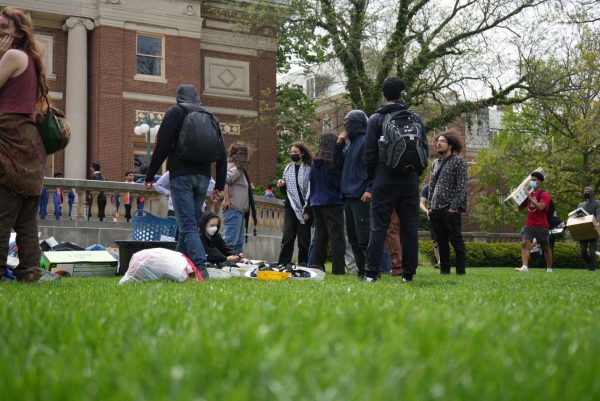UI experts: start job search early
February 2, 2009
With the negative numbers mounting in industries across the board, the looming job search can seem more intimidating than ever before. Layoffs, furloughs and shutdowns have pushed University students to the Career Center earlier than in years past, searching for advice and some good news, according to Assistant Director Katie Kennealy.
With the negative numbers mounting in industries across the board, the looming job search can seem more intimidating than ever before. Layoffs, furloughs and shutdowns have pushed University students to the Career Center earlier than in years past, searching for advice and some good news, according to Assistant Director Katie Kennealy.
“People are hearing about the layoffs and that is what’s getting to be really scary,” Kennealy said. “The thought obviously is if (a company is) laying off, they’re probably not going to be hiring.”
The economy fell at a 3.8 percent pace by the end of 2008, according to a government report released Friday. And the drop-off could increase to a rate of 5 percent or more as the recession enters a second year. Unemployment numbers have also jumped to 6.7 percent in November, and more Americans have been classified as underemployed – taking part-time jobs to make ends meet or being forced to work fewer hours.
“The unemployment rate is rising and it will continue to rise,” said Anne Villamil, an economics professor at the University. “And that’s a typical feature of business cycles that the economy starts contracting … Unemployment typically rises for awhile.”
Get The Daily Illini in your inbox!
The most recent two recessions in the U.S. brought higher unemployment rates and the labor market did not return for some time, Villamil said.
“That’s clearly going to a concern for people looking for jobs,” she added.
While there has been much speculation about “safe industries,” those shielded from the economic situation, Kennealy said she doesn’t put much stock in those guesses.
“At this point, everyone is affected – it’s just the degree (your particular industry) has been affected that varies,” Kennealy said.
And when it comes down to it, Kennealy admits there’s nothing that can absolutely guarantee finding a job even without an economic crisis, but that the center has made being proactive a focus with job-seeking students this year. “We’re just trying to meet students where they’re at and make this a process a little less daunting,” she said.
A workshop geared at coping during tough economic times is already being planned, but for now, the center’s staff is emphasizing networking and using as many job search resources as possible.
Even for students who feel uncomfortable or phony about the idea of networking, Kennealy suggested starting small.
“Start out talking to your parents or your friends,” she said. “That isn’t as intimidating as approaching a stranger, so talk to somebody you feel comfortable with. Start telling them types of things you’re looking for and they may take it an extra step.”
Graduating students shouldn’t discount internships, either, Kennealy said.
“Obviously the ideal situation is you get an internship, they love you and you’re offered a full-time position,” she said. “And that is still happening … For those students graduating and having difficulty finding full-time positions, there are sometimes companies willing to take recent grads. And that’s going to be better to continue gaining experience as opposed to not working at all.”
Getting an early start is more important than ever in an economic downturn, Kennealy said.
“In the past we’ve had a lot of students that kind of waited until further along in spring semester,” she said. “Now, we’re really stressing to them at this point that starting early is going to be (beneficial) for them and waiting is only going to put them further behind.”






